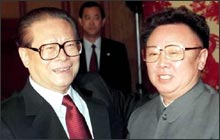A Wedge Between China and North Korea?
Update 7/21: Senator John Voinovich, who cried when he previously announced that he couldn’t support John Bolton’s confirmation, now says he would. More.
 North Korea’s decision to test those missiles is looking more like a miscalculation today than it did two weeks ago. South Korea has halted the delivery of aid (for now), Japan is preparing for a new round of sanctions, the United States may do the same, and the U.N. Security Council unanimously passed a resolution that John Bolton himself must have felt reasonably good about (rather than proving to be an embarrassment, Bolton has shown himself to be effective; the Senate should confirm him).
North Korea’s decision to test those missiles is looking more like a miscalculation today than it did two weeks ago. South Korea has halted the delivery of aid (for now), Japan is preparing for a new round of sanctions, the United States may do the same, and the U.N. Security Council unanimously passed a resolution that John Bolton himself must have felt reasonably good about (rather than proving to be an embarrassment, Bolton has shown himself to be effective; the Senate should confirm him).
The worst news for the North Koreans must have been China’s decision to vote for the resolution. Now, I don’t want to overstate this. These are narrow sanctions that, by themselves, won’t exactly set off panic in Pyongyang. Beijing did not cast this vote out of a new-found desire to be America’s “strategic partner.” Still, the vote had great symbolic significance to North Korea, a nation where symbols, by default, are everything. The North Koreans are now diverting some of their vitriol toward the U.N. and privately, toward China as well.* We ordinary folk do not know why China did this. Austin Bay thinks China voted for the resolution because North Korea ignored its warnings and humiliated it. As I explained before, I believe that’s one of several factors that probably caused white-hot debate in the Forbidden City:
China’s initial reaction will be anger that North Korea made fools of them. The subsequent reaction will be more paralysis among bickering octagenarians. Some will want to continue milking North Korea as a distraction of U.S. diplomatic and military power. Others see North Korea as a disobedient child and a growing liability. Their hands will be strengthened by any spillover costs to China that result from U.S. economic measures, particularly a PATRIOT 311 designation. They will also argue that North Korea’s threats have driven Japan deeper into the arms of the United States and undermined the presidency of Roh Moo Hyun, very possibly the best the Chinese could hope to get at this stage. In other words, North Korea’s actions could precipitate the sorts of military and diplomatic bonds between Asian nations and the United States that China seeks to loosen.
Score this round for the good guys. Yet it will soon be meaningless if the U.S. and Japan don’t follow up with robust measures, because China probably still considers the preservation of the North Korean regime to be in its interests. For too long, the U.S. strategy for North Korea has been to turn to China, which, to put it mildly, does not share our interests. The United States must find ways to influence events inside North Korea itself. We can only exert that influence if we isolate the regime and empower the people.
*Caveat: It’s all a bit self-serving for the Chinese, who want America to think they’re doing everything they can to pressure North Korea, to have North Korea play the role of a rebellious satellite. Remember — even paranoid people have real enemies.
I had figured China did this to assuage Japanese fears and help postpone the normalization of the Japanese military, which is probably a bigger concern to its interests than NK. That’s probably too simple, but I don’t think they like the tone of the debate in Japan right now.